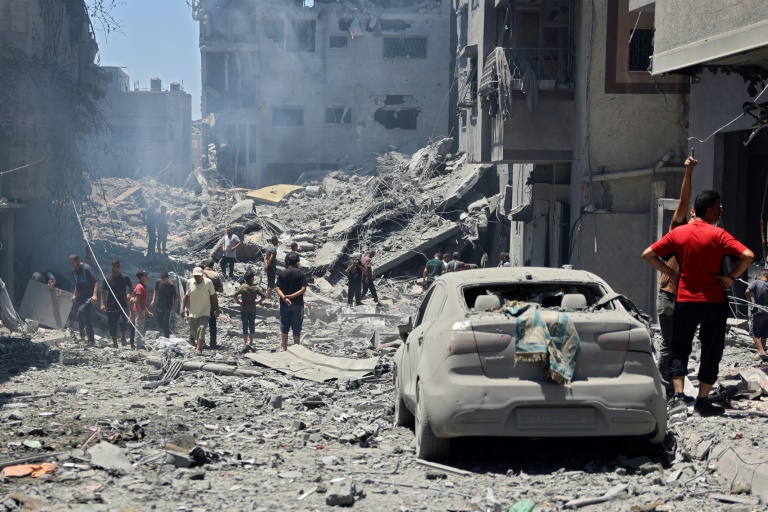Surrounded by a sea of rubble in northern Gaza, the Palestinian Al-Balawi family hung blankets over the ruins of their home to create a makeshift tent to protect themselves from the scorching summer heat.
Families are struggling to find food in Jabalia refugee camp after nearly nine months of war following an Oct. 7 Hamas attack.
Residents of the Gaza Strip are suffering from severe shortages of supplies, including food and water, coupled with Israeli bombardment of the area, forcing desperate mothers like Umm Shirazi Al Balawi to fight for survival with no end to the conflict in sight.
“No vegetables, no fruit. No vitamins. When I get sick I stay in bed for two or three weeks until I recover,” the 33-year-old told AFP.
“This war has to stop because it is a war of displacement, it is a war of annihilation.”
Jabalia has been particularly hard hit in recent weeks, with Israel launching a major bombing campaign as part of an intense ground offensive in northern Gaza that the army has previously said was outside the control of Hamas militants.
Israeli forces recovered the bodies of hostages from Jabalia and reported “probably the heaviest” fighting since the start of the war in May.
– Evacuating from tent to tent –
As fighting rages, desperation is growing among Gaza's 2.4 million residents, and humanitarian agencies have warned they will be unable to deliver aid.
Critical food supplies are piling up undistributed on the Palestinian side of the Kerem Shalom crossing, a key route for aid entering the Gaza Strip.
Israel says it has allowed supplies to be imported and has asked agencies to step up distribution, but aid groups, including the United Nations, say they are unable to receive them due to deteriorating security in the Gaza Strip.
The war erupted after a Hamas attack on October 7 that killed 1,194 people inside Israel, most of them civilians, according to an AFP tally based on official Israeli figures.
Israel vowed to retaliate by eliminating Hamas's grip on Gaza, and the ensuing bombings and ground operations have killed at least 37,598 people, the majority of them civilians, according to the Gaza Health Ministry.
Israel says its bombings are aimed at destroying Hamas infrastructure, but they are only exacerbating the misery of the people in the Gaza Strip.
At least 24 people were killed in massive airstrikes on two Gaza City neighborhoods on Saturday.
The attacks reduced several housing complexes to rubble, while the Israeli army said it targeted two Hamas military infrastructure facilities.
“People are being forced to flee from house to house, tent to tent, school to school,” Umm said.
“They (the Israelis) told people to go to Rafah before telling them to evacuate Rafah. They are doing the same in Khan Yunis. For how long?”
– “I don't have a home” –
The Al-Balawi family is in dire straits, desperately searching the rubble-ridden wasteland for pillows, food and other items.
“The situation was very difficult (before the war), and after the war it got even worse,” said Um's husband, Abu (34).
He pulled a pink cushion from the remains of a building and handed it to his wife, who patted it down and brushed the dust off.
In another place, he used a shovel to clear away a pile of rubble and find a red teddy bear for his young son.
He then led his children through the destroyed streets to get some much-needed water, then returned to his tent and fed his children bread and beans from his bowl.
“There is a shortage of food and water, there is barely any food to feed the children, and disease is spreading in all the areas where displaced people have gathered.”
For his nine-year-old son, Shirazi, the horrors of war are clear despite his age.
“I can't find my clothes. I have no clothes,” he complains.
“I don't have any toys,” he added, holding up a broken doll. “I don't have a home.”
str-jfx/jd/dcp



